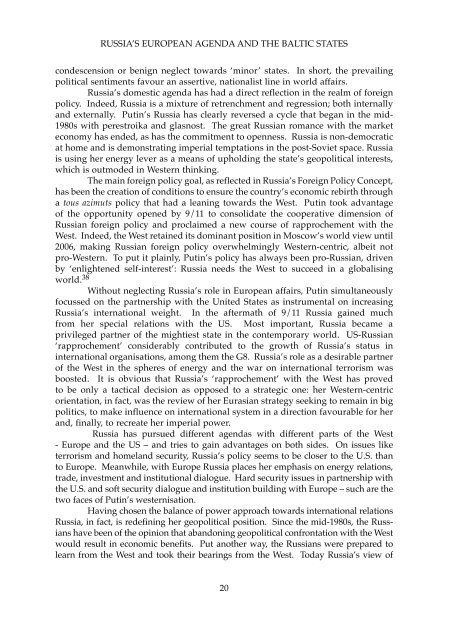Russia's European Agenda and The Baltic States - Defence ...
Russia's European Agenda and The Baltic States - Defence ...
Russia's European Agenda and The Baltic States - Defence ...
Create successful ePaper yourself
Turn your PDF publications into a flip-book with our unique Google optimized e-Paper software.
RUSSIA’S EUROPEAN AGENDA AND THE BALTIC STATES<br />
condescension or benign neglect towards ‘minor’ states. In short, the prevailing<br />
political sentiments favour an assertive, nationalist line in world affairs.<br />
Russia’s domestic agenda has had a direct reflection in the realm of foreign<br />
policy. Indeed, Russia is a mixture of retrenchment <strong>and</strong> regression; both internally<br />
<strong>and</strong> externally. Putin’s Russia has clearly reversed a cycle that began in the mid-<br />
1980s with perestroika <strong>and</strong> glasnost. <strong>The</strong> great Russian romance with the market<br />
economy has ended, as has the commitment to openness. Russia is non-democratic<br />
at home <strong>and</strong> is demonstrating imperial temptations in the post-Soviet space. Russia<br />
is using her energy lever as a means of upholding the state’s geopolitical interests,<br />
which is outmoded in Western thinking.<br />
<strong>The</strong> main foreign policy goal, as reflected in Russia’s Foreign Policy Concept,<br />
has been the creation of conditions to ensure the country’s economic rebirth through<br />
a tous azimuts policy that had a leaning towards the West. Putin took advantage<br />
of the opportunity opened by 9/11 to consolidate the cooperative dimension of<br />
Russian foreign policy <strong>and</strong> proclaimed a new course of rapprochement with the<br />
West. Indeed, the West retained its dominant position in Moscow’s world view until<br />
2006, making Russian foreign policy overwhelmingly Western-centric, albeit not<br />
pro-Western. To put it plainly, Putin’s policy has always been pro-Russian, driven<br />
by ‘enlightened self-interest’: Russia needs the West to succeed in a globalising<br />
world. 38<br />
Without neglecting Russia’s role in <strong>European</strong> affairs, Putin simultaneously<br />
focussed on the partnership with the United <strong>States</strong> as instrumental on increasing<br />
Russia’s international weight. In the aftermath of 9/11 Russia gained much<br />
from her special relations with the US. Most important, Russia became a<br />
privileged partner of the mightiest state in the contemporary world. US-Russian<br />
‘rapprochement’ considerably contributed to the growth of Russia’s status in<br />
international organisations, among them the G8. Russia’s role as a desirable partner<br />
of the West in the spheres of energy <strong>and</strong> the war on international terrorism was<br />
boosted. It is obvious that Russia’s ‘rapprochement’ with the West has proved<br />
to be only a tactical decision as opposed to a strategic one: her Western-centric<br />
orientation, in fact, was the review of her Eurasian strategy seeking to remain in big<br />
politics, to make influence on international system in a direction favourable for her<br />
<strong>and</strong>, finally, to recreate her imperial power.<br />
Russia has pursued different agendas with different parts of the West<br />
- Europe <strong>and</strong> the US – <strong>and</strong> tries to gain advantages on both sides. On issues like<br />
terrorism <strong>and</strong> homel<strong>and</strong> security, Russia’s policy seems to be closer to the U.S. than<br />
to Europe. Meanwhile, with Europe Russia places her emphasis on energy relations,<br />
trade, investment <strong>and</strong> institutional dialogue. Hard security issues in partnership with<br />
the U.S. <strong>and</strong> soft security dialogue <strong>and</strong> institution building with Europe – such are the<br />
two faces of Putin’s westernisation.<br />
Having chosen the balance of power approach towards international relations<br />
Russia, in fact, is redefining her geopolitical position. Since the mid-1980s, the Russians<br />
have been of the opinion that ab<strong>and</strong>oning geopolitical confrontation with the West<br />
would result in economic benefits. Put another way, the Russians were prepared to<br />
learn from the West <strong>and</strong> took their bearings from the West. Today Russia’s view of<br />
20

















